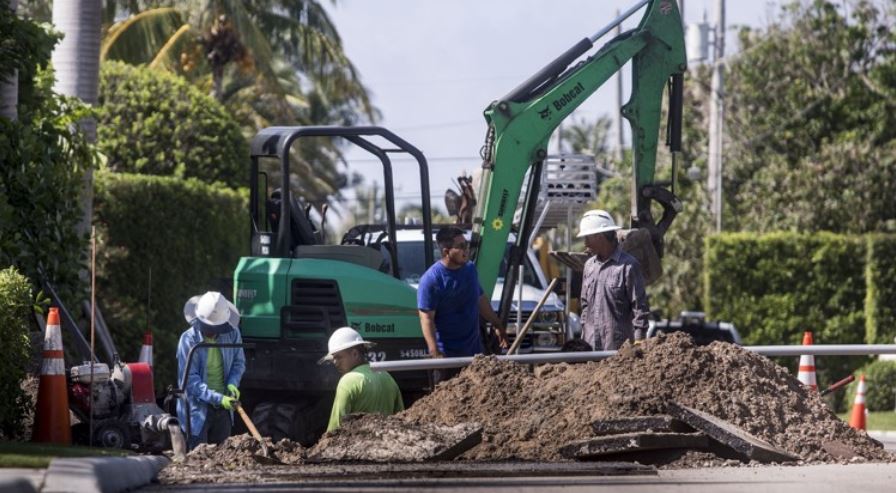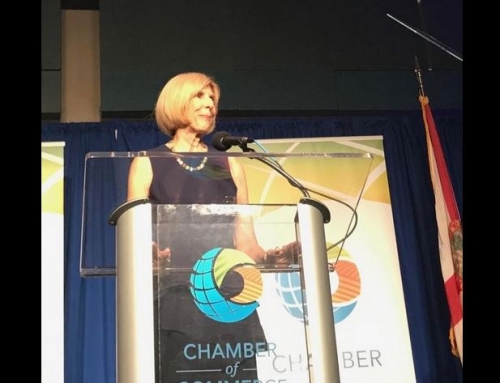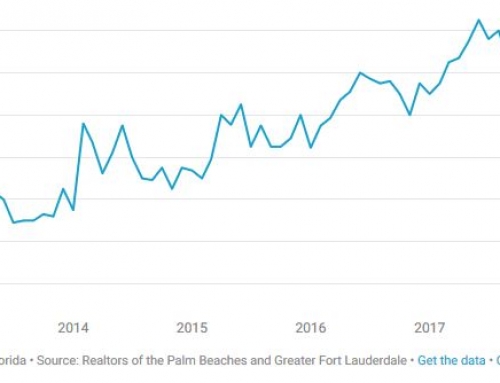Originally Posted: 9:30 a.m. Sunday, August 26, 2018
With two lawsuits resolved and a $22.6 million loan nearly spent, Palm Beach is moving forward and will soon issue bonds to finance a bulk of the cost of burying all overhead utility lines on the island.
Earlier this month, the Town Council unanimously approved up to $60 million in bonds to be issued for 30 years. The town can expect to “lock in” an interest rate of around 3.8 percent in mid-September, and the money will be available in early October, said Jay Glover, managing director with PFM Financial Advisors, a town consultant.
By waiting longer, the town would have risked having to borrow at a higher rate, increasing the cost of the debt, he said.
“Locking this in today … really takes a lot of risk off the table,” Glover said.
The plan is to use special assessments of private property owners to pay the bond debt. The town began collecting the assessments on tax bills last November. Property owners have been allowed to prepay their assessments in full to avoid paying interest costs.
Construction began last year on the first of eight phases to bury all overhead power, cable television and phone lines on the island. The project is scheduled to be completed in 2026. Officials have estimated the construction cost at around $100 million.
The town is using a variety of means to cover the cost. It has relied on $22.6 million in short term, low-interest bank loans, known as “commercial paper,” to finance the early stages. But the $22.6 million is almost entirely spent, and more money will soon be needed to move forward, according to Finance Director Jane Le Clainche.
The council also decided to help finance the undergrounding project using half of the town’s proceeds from the county’s 1 cent sales surtax, which amounts to an estimated $550,000 a year over a period of 10 years, beginning last year.
Glover said Palm Beach can expect to do a separate bond issue of about $10 million to $15 million in about three years to continue financing the project. IRS rules require the bond money to be spent within three years of being issued, so the amount of bonds issued cannot far exceed the pace of construction.
“That is what constrains us to the $60 million,” Glover said.
Voters narrowly approved a $90 million bond issue to finance the project in a March 2016 referendum. But the council postponed issuing the bonds until after a resident’s lawsuit challenging the referendum could be resolved.
In March, Florida’s 4th District Court of Appeal in West Palm Beach upheld a lower court’s dismissal of South End resident Arthur Goldmacher’s lawsuit. He alleged in the suit that the referendum ballot language was misleading because it didn’t specify that property taxes would be used to pay for the project only if it wasn’t covered by the special assessments.
The town’s attorney, Robert Wilkins, countered that the ballot language did not say or imply that property taxes would be used as the primary method of paying the bonds.
Palm Beach County Circuit Judge Cymonie Rowe found that the referendum ballot language was neither misleading nor inconsistent and didn’t violate any town laws. Rowe said the town could issue the bonds.
Two other lawsuits were filed challenging financing plans for the undergrounding project.
Only one is still active. But Rick Miller, a lawyer with Locke Lord, Palm Beach’s bond counsel, said Friday that the remaining suit does not challenge the bond issue but rather the town’s ability to assess property owners to pay for the project.
In 2017 in Palm Beach County Circuit Court, North End resident Michael Scharf and South End resident Carol Kosberg filed a class-action suit alleging the assessments are invalid because officials relied on a consultant’s “arbitrary assessment methodology” to determine the benefits of the undergrounding on individual properties.
The town has said it’s using assessment methodology that has been upheld by the courts in other cases.
The Kosberg-Scharf case is scheduled for a Nov. 13 hearing so a judge can decide whether to certify it as a class-action suit.
If the case goes to trial and if the judge were to find that the assessment methodology used by the town was arbitrary, the town would have an opportunity to use a different assessment methodology for the project, Miller said.
Moreover, the bonds are ultimately supported by the “full faith and credit of the town,” meaning the full taxing power of the town, Miller said. So if assessments aren’t used to repay the bonds, property taxes could be used for that purpose, he said.
The third lawsuit, filed by a Palm Beach Towers property owner, also did not challenge the bonds or referendum language.
In June, a judge ruled for the town in its legal battle with PBT Real Estate LLC, which contended that owners of the 273 units at the Towers should not be assessed to pay for the undergrounding because their utilities already are buried.
U.S. District Judge Donald M. Middlebrooks, for the U.S. District Court for the Southern District of Florida, granted the town’s motion that he rule on the matter without allowing it to go to trial. Middlebrooks said the town demonstrated that, when setting the assessments, that it had considered factors other than whether a parcel already had undergrounded its utilities.
The Palm Beach Towers’ board of directors said it was not involved with the lawsuit.
As of early June, the town said it spent more than $400,000 in legal costs defending against the three suits.







